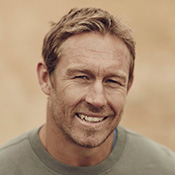
Jonny Wilkinson CBE
Arguably one of the best-known rugby players in the world, Jonny Wilkinson famously kicked the drop goal that won England the World Cup with just seconds left in the final. He then went on to be rated as one of the best players in the world in both internationals and at club level with Newcastle and Toulon. But behind the adulation and success there was pressure and sacrifice, and a long road to understanding how to manage stress and gain clarity, focus and balance.
A promising youth player, Jonny abandoned his university studies to join the Newcastle Falcons, where he would spend the next 12 years. He made his international debut at the age of 18, becoming England’s youngest ever player, and within 18 months had scored 100 test points and played in his first World Cup. In the 2003 World Cup, he played a key role scoring in almost every match in which he played. A tight final against rugby powerhouse Australia, on their home turf, saw an epic battle only decided in the last 30 seconds of the game when Jonny received a pass and scored a drop goal that saw England win the title for the first time in their history. He also became the competition’s top points scorer. The year also saw him named the IRB International Player of the Year and BBC Sports Personality of the Year.
In a stellar career Jonny would accumulate four Six Nations titles and become the highest international points scorer of all time. At club level he left Newcastle after helping them to Premiership and Powergen Cup titles and joined RC Toulon. At the French club he became their most popular player during their most successful period. Off the pitch he has written five books about rugby and his life, was a columnist for The Times, and has co-founded his own online fashion brand, Fineside. He also continues to be involved in coaching at Toulon.
Much of Jonny’s success on the field, however, took its psychological toll. In honest, unguarded speeches he recounts how his focus and dedication to the sport he loves meant overlooking important parts of his life. He considers what that experience has taught him about mental health and why everyone needs to understand the difference between what matters and what is imposed on us by others. Combining his professional experience with a look at physical and mental wellbeing, he offers a practical examination of how teams and individuals can be clear about their goals, perform and collaborate better, and live less stressful, healthier, meaningful lives.